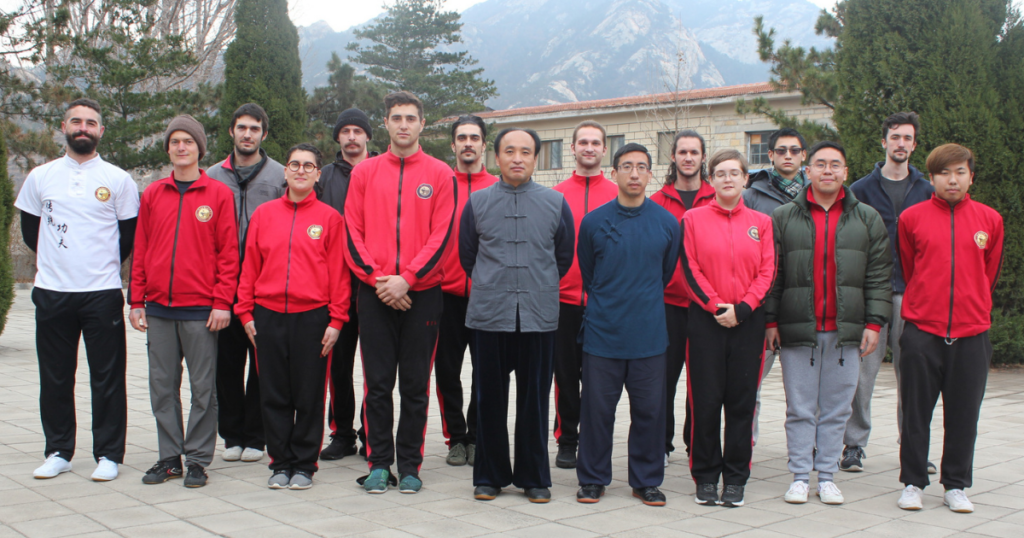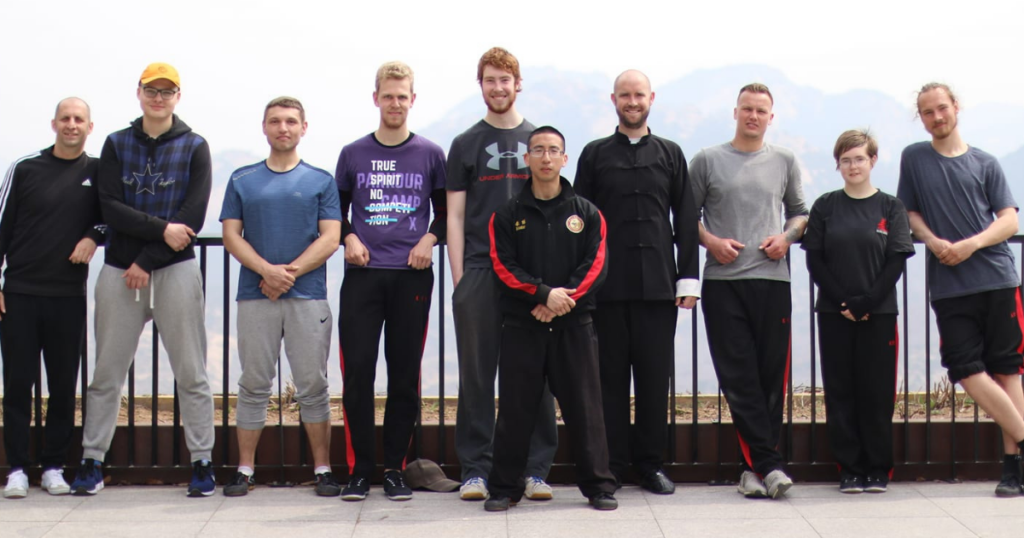We already had the chance to discuss how it feels to be teaching Wushu in China, Japan and Hong Kong, three places renown to be already filled with top level Wushu masters and trainers.
Today let’s head back to China with Lôc Le Van, a France born instructor who lived, trained and teach on the Kunyu mountain 崑嵛山 (Shandong province), for almost six years and is still today one of their top instructors. Don’t be fooled by his humility, he is actually a very skilled Baji Quan and Wing Chun practitioner.
Remember to check out our previous interviews by clicking below:
Wukong: Hi Lôc! Teaching on a chinese mountain as a foreigner must be an amazing experience and I’m eager to her your story. Could we start with a short introduction of yourself?
Lôc: My parents are from Vietnam and I am born in France.
I decided to go to China to study Wushu full time in 2014 and spent almost 6 years there at the Kunyu Mountain Martial Arts Academy.
While I was there, I had the chance to become my Sifu’s assistant for two years, and to get several Wushu certifications that unfortunately are useless in France where most foreign diplomas are ignored… That’s why once I got back to France, I completed the highest national sport instructor diploma to hopefully be able to make a living by teaching sports.
Wukong: How have you started your martial arts career?
My elder sister and I were both bullied at school, so our parents decided to sign us up for Judo classes. I then trained from 6 to 18 years old. Our teacher was truly amazing: Tall and huge, but also really benevolent. He taught us how to improve both physically and mentally and to express ourselves through martial arts.
Once I graduated from high school, I then stopped every side activity to focus on school only.
Wukong: How did you discover Wushu, and why did you decide to go to Kunyu Mountain?
Lôc: Discovering Wushu was completely by chance.
My best friend was literally living the opposite of the Hoang Nam school in Antibes (Editor’s note: Hoang Nam school is a very famous Wushu, and Taekwondo academy in France). The timing was just perfect since we were both getting super fat (let’s be honest!).
We then stepped in this universe, until one day one of our fellow student was celebrating his departure to China, where he would go to train intensively.
Curious about what was training in China like, I looked over the internet and decided to go to Kunyu Mountain after I red about another French guy who decided to stay there after having tried different Wushu schools in China. I actually met him when I went there myself at the end of my engineer studies in 2011. I spent three month practicing northern Shaolin style, and it was like discovering a whole new world… That French guy was then training with the one who would later become my master: Sifu Guo Xinmin 郭心民.

Back in France, I then started intensive research about different styles, and became fascinated by Wing Chun and Baji Quan. After learning Wing Chun for a year in a small school, and even though I did enjoy learning its concepts, I was missing two important things for me: full contact sparring and hardcore physical conditioning.
That’s why I tried to complete my training with other sports, until I didn’t have a second left to do anything else… The minute I was off work, I would go to either my traditional Wushu training or other martial arts classes (Viet Vo Dao, and MMA).
Once, during a bootcamp, I had a lightbulb moment and realized that that was not how I wanted to live my life, and train.
My initial plan was to go back to Kunyu Mountain one or two years to build strong basics and then visit other masters to focus on a few styles. But in the end, I stayed there and became master Guo XinMin disciple, training and teaching beside him Wing Chun, Taiji (mainly Chen style and a bit of Yang), Jin Gang Li Gong (a Qi Gong training method), and Sanda.
While I was there I was able to perform in as much local and national competitions as I could, between 2015 and 2019, and made it to the podium several times.
Wukong: How was your first Wushu experience there? Was it different from training in France?
Lôc: Even if I practiced a little bit of Wushu in France, I was only considering it as a leisure, meaning I could replace it with any other activity.
But being in China, practicing almost everyday for at least 6 hours a day made it completely different.
In the west, we can often read stories about people that “dedicate themselves to martial arts”… But who actually just practice it in their free time. Indeed, since in most countries it is not considered and valued as “a real job”, one as to work to survive. When I’ve met with martial arts teachers that actually dedicate themselves to the practice and teaching of martial arts, it fascinated me.
After coming back to France I tried to make it the same way as many people do: working most of the day and spending most of my free time in martial arts gyms. But then I realized that I will never be able to live my whole life that way. So I saved enough money to go back to China for several years.

Wukong: How did you decide to start teaching in China?
Lôc: I didn’t really decide or plan to teach in China.
Participating in some competitions, I quickly realized that even if I’d spend the rest of my life training, I would never be able to achieve a high level. But it didn’t discourage me to keep practicing and give my best: after all, it is comforting to know that their will always be people to pull you higher.
When my Sifu asked me if I could help him with the teaching I said yes immediately, but I was full of doubts.
I wasn’t sure I was good enough, plus I have a very introvert personality, so I didn’t know if I could handle a group of people, and I felt also a bit concern that I was French, in a school where most of the people come to learn from Chinese teachers.
Wukong: Talking about it, how the fact that a foreigner is teaching Wushu China was welcomed by the Wushu crowd there?
Lôc: I don’t really know about the “crowd”, but I have seen an evolution of the local mentality regarding foreigners.
Local people would sometime criticize my masters and the school itself for teaching to foreigners, but over the years, I got the feeling that they accepted us more. My Sifu told me that it was more and more difficult to attract young Chinese people in a martial arts carrier, as they are often more interested by other trending fighting sports such as Taekwondo or MMA.

Wukong: How did your students feel at first?
Lôc: For most of them it was actually not a problem to have me as a coach as most of them are foreigners. So communicating was easier (we didn’t need a translator).
The second good point was that because I went through the exact same path as them, I could guide them to get through it. The upside was really on the communication part, knowing that for any technical gap or questions I would always redirect people to my Sifu.
Wukong: Did you encounter issues as a foreign coach?
Lôc: I didn’t get into many troubles with the teaching itself, but sometimes felt like I was split into two “worlds”.
Differences between cultures cannot be only understood intellectually. You need to spend some time with people living differently to be able to accept it. I tried to be part of a bridge to ease the communication between both sides, but sometimes it feels like people walk over you from both sides.
From my point of view, the main problem is that westerners need to understand before practicing, when in China practice comes first.
Wukong: Do you feel legit now compared to other native coachs?
Lôc: Before I had to leave China, I was feeling more and more included in the coachs team, and found my place. I felt legit once I understood that I didn’t need to be technically as good as a Chinese coach, and that I could focus on new ways to help people understand better
It feels a bit ironic that I struggled to adapt to the Chinese way of working and started to feel more comfortable when I had to go back in France, where I feel like starting from ground zero to re-adapt to the French culture.

Wukong: Many people don’t see how a foreigner can teach in Asia, since they already have so many high level masters there. What is your opinion?
Lôc: It’s a fact that the Wushu level is high, but it is also a great chance that there are more and more Chinese masters willing to openly share their knowledge with the West.
I believe that nowadays, the most important, is to work on how to adapt the traditional teaching to the needs of the current world.
For example, I think that to adapt traditional techniques to modern combat sports we need traditional teachers / practitioners and combat sports coaches / athletes to work together.
Wukong: Any other words for the Wukong audience?
Lôc: I really hope that in the future there will be more people trying to discover new cultures and build stronger connexion between them.
Learn more about the Kun Yu Mountain Shaolin Martial Arts Academy, or contact Lôc directly through below links:
- Send Lôc an email: wushuloc@gmail.com
- Kun Yu Mountain Academy: https://www.chineseshaolins.com/
- Master Guo Xinmin disciples Facebook Group: https://m.facebook.com/guostylewingchun
Interview made by Ghyslain Kuehn